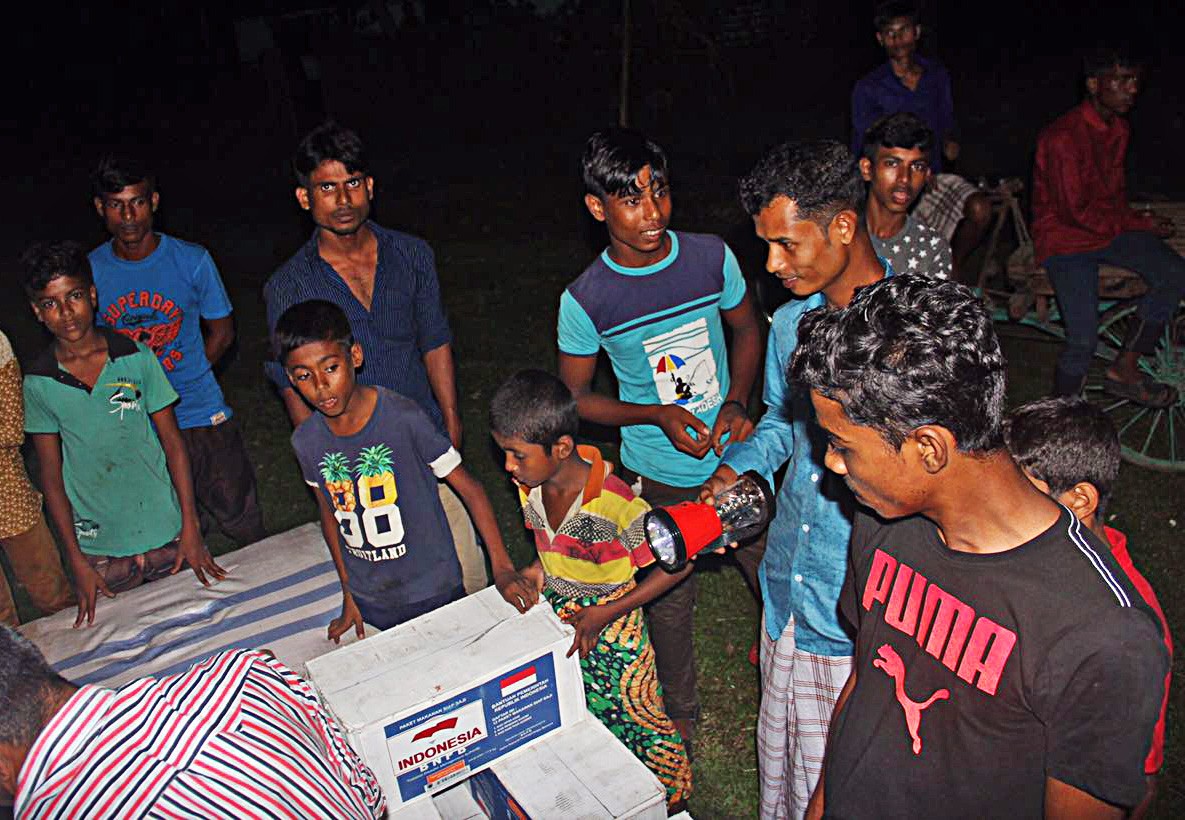Popular Reads
Top Results
Can't find what you're looking for?
View all search resultsPopular Reads
Top Results
Can't find what you're looking for?
View all search resultsWill Indonesia bring Rohingya to Security Council?
To date, the Security Council lacks any resolution addressing the plight of the Rohingya Muslim minority.
Change text size
Gift Premium Articles
to Anyone
 Rohingya refugees in Bangladesh receive aid packages from Indonesia on Sept. 20, 2017. Indonesia has dispatched aid to Rohingya refugees displaced from their homes in Myanmar and seeking refuge in Bangladesh. The first batch of aid, which includes tents, rice, sugar and sanitation supplies, were transported by Indonesian Military aircrafts. (Courtesy of the Foreign Ministry/file)
Rohingya refugees in Bangladesh receive aid packages from Indonesia on Sept. 20, 2017. Indonesia has dispatched aid to Rohingya refugees displaced from their homes in Myanmar and seeking refuge in Bangladesh. The first batch of aid, which includes tents, rice, sugar and sanitation supplies, were transported by Indonesian Military aircrafts. (Courtesy of the Foreign Ministry/file)
O
n June 9, after intensified bilateral and multilateral diplomacy and campaigns in the past three years, Indonesia secured a non-permanent seat in the UN Security Council for the 2019-2020 period.
After gaining more than two-thirds majority votes from the UN General Assembly members, Foreign Minister Retno LP Marsudi revealed Indonesia’s main priorities in the Council. This includes creating a global ecosystem of peace and stability by advancing peacekeeping and peacebuilding, promoting greater engagement and synergy between the Council and regional organizations in conflict prevention, ensuring synergy between sustaining peace and global development, in particular the 2030 Agenda by forging global partnership for combating terrorism and radicalism through developing a global comprehensive program that addresses the root causes.
However, under the slogan of a “true partner for world peace”, can we expect Indonesia to bring in the conflict in the Rakhine state in Myanmar as a Council agenda? To date, the Security Council lacks any resolution addressing the plight of the Rohingya Muslim minority.
It is dilemmatic for Indonesia to “internationalize” the Rakhine conflict in the Security Council. On the one hand, under President Joko “Jokowi” Widodo’s leadership since 2014, Indonesia has generally played a greater role in facilitating and accommodating refugees in Indonesia and abroad.
Indonesia, with special trust from Myanmar to directly approach the government regarding the conflict, has paid more significant attention to the Rohingya. It was shown through an enhanced bilateral engagement with Myanmar’s government, multi-stakeholder diplomacy with civil society organizations in the delivery of humanitarian aid, and the establishment of schools and hospitals for the Rohingya from a multi-donor trust fund.
But bringing the agenda concerning the Rohingya to the Security Council will likely disrupt “ASEAN centrality” -- and Indonesia’s natural leadership position within the region.
It has been firmly established that ASEAN would unlikely facilitate in addressing the root causes of prosecution against the Rohingya. The ASEAN Summit in Singapore in April had “discussed and received a briefing from Myanmar on the humanitarian situation in Rakhine State”, its statement said. However it only reaffirms a humanitarian approach in the delivery of aid, in particular through the ASEAN Coordinating Center for Humanitarian Assistance on disaster management.
Although then Malaysian prime minister Najib Razak had stressed that “the situation in Rakhine state in Myanmar can no longer be considered to be a purely domestic matter,” under Singapore’s chairmanship of ASEAN, Prime Minister Lee Hsien Loong has reaffirmed that “ASEAN did not have the authority or the capacity to directly intervene in Myanmar's internal affairs”.
As ASEAN works with absolute adherence to non-interference, therefore, a proposal to deal with an internal conflict would undoubtedly bring disunity among ASEAN members, and would especially discredit Myanmar.
During its Security Council non-permanent membership in 2007-2008, Indonesia rejected France’s proposal for the “responsibility to protect” to be exercised by the Security Council when Cyclone Nargis brought devastation to Myanmar in May 2008, affecting millions who were in dire need of aid. Then foreign minister Marty Natalegawa stressed, “there are other better forums to discuss the humanitarian dimension of the Myanmar situation”.
On Nargis, however, the ASEAN Emergency Rapid Assessment Team (ERAT) was then activated, leading the most expeditious and effective deployment of relief workers while other foreign channels found it difficult to send aid under Myanmar’s military regime.
Now, with the absence of durable solutions towards the prolonged humanitarian crisis in the Rakhine state regionally, does Indonesia see the Security Council as a better option than ASEAN?
Indonesia will likely “play safe” during its early appointment as one of the Security Council’s non-permanent members.
Moreover, Indonesia cannot pursue its individual interests during the Council’s decision-making process. As a country holding a seat allocated to the Asia-Pacific regional grouping, it needs to very carefully consider its representation of the whole region thoroughly in this UN’s most powerful body
With ASEAN’s leadership position naturally attached to Indonesia, only collective interests will likely be put forward by Indonesia in the Council. And even if the Rohingya is one of the items, it will only be advanced through synergizing and engaging the Security Council with ASEAN.
Only if Indonesia could make the Security Council work in ASEAN affairs and the other way around, and of course with consent from Myanmar, can we then expect Indonesia to bring Rohingya to the Security Council table.
***
The writer is taking postgraduate studies in public international law at the Leiden University, the Netherlands.









